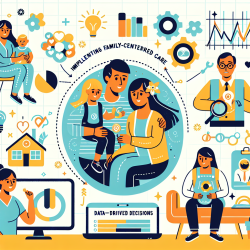Introduction
In the ever-evolving field of speech-language pathology, staying informed about the latest technological advancements is crucial for improving therapeutic outcomes. A recent study titled "A tool for federated training of segmentation models on whole slide images" offers valuable insights into federated learning, a method that can be applied to enhance data-driven decisions in speech therapy. This blog explores how practitioners can leverage these insights to improve their skills and outcomes for children.
Understanding Federated Learning
Federated learning is a decentralized approach to model training that allows multiple institutions to collaboratively train a model without sharing sensitive data. This is particularly relevant in fields like computational pathology, where data privacy is paramount. The study demonstrates that federated learning can achieve comparable performance to traditional centralized training methods, even when data is distributed across different institutions.
Implications for Speech Therapy
In speech therapy, diverse datasets are essential for developing robust models that can generalize across different populations. However, data sharing is often restricted due to privacy concerns. Federated learning offers a solution by enabling collaborative model training while keeping data secure at its source.
Here are some potential applications of federated learning in speech therapy:
- Personalized Therapy Plans: By training models on diverse datasets from multiple institutions, therapists can develop personalized therapy plans that are more effective and tailored to individual needs.
- Improved Assessment Tools: Federated learning can enhance the development of assessment tools that accurately reflect the diversity of speech patterns across different demographics.
- Enhanced Predictive Models: Predictive models trained through federated learning can help identify children at risk of speech and language disorders earlier, allowing for timely intervention.
Encouraging Further Research
The study's findings highlight the potential of federated learning in fields beyond computational pathology. Speech-language pathologists are encouraged to explore this innovative approach and consider how it might be integrated into their practice. By staying informed and open to new methodologies, practitioners can continue to improve outcomes for children in their care.
Conclusion
Federated learning represents a promising advancement in data-driven decision-making, offering a way to harness the power of diverse datasets while maintaining data privacy. Speech-language pathologists can benefit from these insights by adopting federated learning techniques to enhance therapeutic outcomes for children. As the field continues to evolve, embracing such innovations will be key to delivering high-quality, personalized care.
To read the original research paper, please follow this link: A tool for federated training of segmentation models on whole slide images.










